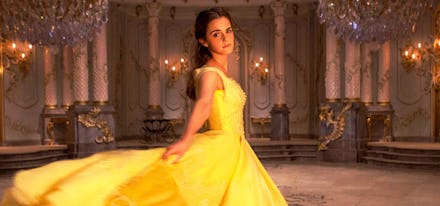Is Emma Watson ditching the corset in 'Beauty and the Beast' as feminist as she thinks it is?

If you didn't know it already, Emma Watson is all about feminism.
She's been known to go around cities leaving feminist literature in her path. She's consistently spoken out about what feminism really is. In just the past few weeks, she's gone to bat for her own feminism after people claimed that a revealing photoshoot meant she was violating her feminist ideals. She has openly aligned herself with feminist efforts — like He for She, which calls on men to get involved in feminist causes as well.
And it seems now that her feminism has extended to her acting. For the live-action reboot of Beauty and the Beast, in which she plays Belle, Watson ditched the corset, a garment with a reputation of being super restrictive and not-so-feminist because it can harm women if worn incorrectly.
In an interview with Women's Wear Daily, Beauty and the Beast costume designer Jacqueline Durran revealed that Watson arrived on set already determined to not portray Belle as a "corseted, impossible idea of female beauty."
In Watson's defense, the reasons seem sound, with Watson and Durran outfitting Belle in outfits that were far more utilitarian for when she does things like ride horses or dance.
“Nothing she wears is inhibiting,” Durran said. "She can do whatever she would want to do in any of her costumes. She rides a horse."
That seems powerful, doesn't it? She wants to wear clothes she can actually act the part in. Watson made this decision for herself. It's her choice. If she doesn't want to wear a corset, that's cool. There's absolutely nothing wrong with that decision.
However, to write off corsets as inherently restrictive and not feminist and only for promoting an "impossible idea of female beauty" is to look at corsets from a very, very limited point of view.
The wearing of a corset isn't always oppressive. Times have changed. Right now, women across the world — from Rihanna to Kendall Jenner — are wearing corsets because they want to.
The corset itself has merely fallen victim to its own dark, murky history and its reputation for being dangerous, partly because that's what men wanted women to think back in the 19th and 20th centuries.
You see, throughout that time, men turned the garment into a bit of a tabloid sensation, with exaggerated cartoons in newspapers and doctors theorizing about whether or not they could improve women's moods or cause women to become infertile.
Wearing them incorrectly was and is.
"The corset molds and changes the shape and silhouette of the body, and anything that modifies the body, even if it's only slightly and non-permanently, will always elicit an extreme response," Katy Werlin, a fashion and textile historian, said in a previous interview with Mic. "And there are legitimately harmful things that women (and men) do to their bodies in the name of fashion. Squishing yourself into a slightly different shape with a corset isn't one of them."
Now though, with the right guidance? All good. It's not any more oppressive or restrictive than, say, wearing a bra. "It's strange to me that people talk like this is something that people don't choose to wear," Cora Harrington, the founder of the blog the Lingerie Addict, said in a previous interview. "It's wild to me how people will talk to me about how corsets are oppressive but not talk about all these day to day beauty standards like makeup or even bras."
Although Watson's decision not to wear a corset for the role is certainly commendable, because it's always great when an actress takes a stand for reality when it comes to the female form, it's a bit misguided to write it off as an inherently feminist act.